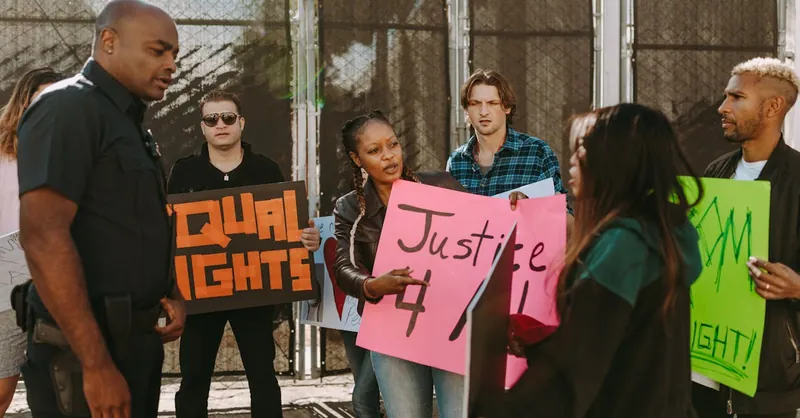Madness of Karens Explained: Unpacking Entitlement & Outrage
Category: Social Issues
Understanding the Madness of Karens: A Deep Dive into Entitlement and Social Turmoil
If you've ever encountered a viral video or a heated discussion about a "Karen," you know the frustration and confusion that comes with witnessing their entitled and disruptive behavior. You’re likely someone who cares deeply about social justice and fairness, and perhaps you’ve wondered why certain individuals seem so relentless in stirring conflict and unfairness under the guise of victimhood or moral outrage. This post unpacks the madness of Karens in a clear, insightful, and socially conscious way, helping you grasp the roots and implications behind their actions. Whether you're a community organizer, an activist, or simply a thoughtful observer who wants to challenge these patterns, my goal is to offer a well-structured critique that goes beyond viral clips and memes. You’ll gain a nuanced understanding of how entitlement, social power dynamics, and cultural context play together to create these toxic interactions. Unlike surface-level content focusing only on isolated incidents, this article will take you through psychological, sociological, and cultural angles, enabling you to recognize and respond to such behaviors more effectively. Ready to dissect the madness and reclaim fairness in public and social spaces? Let’s embark on this journey together.
- Understanding the Madness of Karens: A Deep Dive into Entitlement and Social Turmoil
- Defining the 'Karen' Phenomenon: Origins and Evolution of the Term
- Psychology Behind Entitlement: Why Some People Exhibit Karen-Like Behavior
- Common Traits and Behaviors of 'Karens': From Privilege to Outrage
- Social Media’s Role in Amplifying Karen Incidents and Public Perception
- How Entitlement Leads to Injustice and Unfairness in Everyday Interactions
- Case Studies: Viral Examples Illustrating the Madness of Karens
- The Intersection of Race, Privilege, and Power in Karen Dynamics
- Strategies to Address and De-escalate Karen-Induced Conflicts
- Cultural Commentary: What the Karen Phenomenon Reveals About Society
- The Future Outlook: Can Awareness Curb the Madness of Karens?
Defining the 'Karen' Phenomenon: Origins and Evolution of the Term
The term “Karen” has evolved from a simple internet meme into a robust cultural label that encapsulates a specific type of entitled, often aggressive behavior primarily exhibited by middle-aged white women. Originally surfacing on social media platforms like Reddit and Twitter in the early 2010s, “Karen” became shorthand for individuals who insist on demanding special treatment, frequently at the expense of others’ rights or dignity. This phenomenon is deeply intertwined with broader societal issues such as racial privilege, social entitlement, and power imbalances, making it a powerful lens for understanding microaggressions and systemic injustice.
Over time, the label has shifted from humorous exaggeration to a meaningful critique of social behavior. The modern usage often highlights how these individuals weaponize outrage—typically over minor inconveniences—to assert dominance or resist progressive social change. Key aspects of the “Karen” phenomenon include:
- Entitlement to Exceptional Service or Compliance: Expecting others to prioritize their demands regardless of context or fairness.
- Performative Outrage: Exhibiting exaggerated or unwarranted anger to manipulate situations.
- Neglect of Social Consequences: Ignoring how their actions disproportionately affect marginalized communities.
Understanding the origins and evolution of “Karen” helps expose not just individual incidents of rudeness but the broader systemic patterns that allow these behaviors to perpetuate unchecked. By tracing this linguistic and cultural journey, we uncover how the “Karen” archetype symbolizes longstanding societal tensions—making it essential for anyone interested in fighting social injustice to recognize and address the underlying dynamics at play.

Image courtesy of cottonbro studio
Psychology Behind Entitlement: Why Some People Exhibit Karen-Like Behavior
To truly understand the psychological roots of Karen-like entitlement, it’s essential to explore how certain personality traits, social conditioning, and cognitive biases converge to produce these disruptive behaviors. At the core, this mentality stems from an inflated sense of self-importance and a rigid belief that the world owes them special treatment. Psychologists often link such behaviors to narcissistic tendencies, where individuals crave attention and validation by asserting dominance in social interactions, often through aggressive demands or moral posturing.
Several key psychological factors contribute to this dynamic:
-
Entitlement Mentality: People exhibiting Karen behavior often operate under the assumption that their needs and preferences should override others’. This sense of entitlement is reinforced by past experiences of privilege or unchallenged demands, creating a cycle of expectation without accountability.
-
Projection and Victimhood: When confronted, these individuals frequently cast themselves as victims, using performative outrage to deflect criticism and manipulate social situations. This defense mechanism helps preserve their fragile self-image while shifting blame onto others.
-
Cognitive Dissonance and Moral Licensing: Many Karen-like behaviors serve to justify actions incompatible with social fairness. Through moral licensing, they believe that previous ‘good deeds’ or social standing absolve them from accountability, enabling unchecked entitlement.
-
Social Dominance Orientation: Often, such individuals exhibit a desire to maintain hierarchical social structures that favor their in-group, whether consciously or unconsciously. This results in antagonism toward perceived threats to their privilege, fueling discriminatory or exclusionary behavior.
By identifying these psychological patterns, we gain critical insight into how entitlement manifests and persists, enabling more empathetic yet firm strategies to challenge these behaviors. Recognizing that the madness of Karens is not just about individual rudeness but ingrained psychological drivers empowers activists, organizers, and everyday citizens to dismantle entitlement culture more effectively.

Image courtesy of Mikhail Nilov
Common Traits and Behaviors of 'Karens': From Privilege to Outrage
At the heart of the “Karen” phenomenon lies a distinct constellation of common traits and behaviors that reveal how entitlement fueled by social privilege translates into disruptive and often unjust actions. Understanding these recurring patterns is crucial for recognizing the ways Karens wield their unearned social power to create conflict, often under the guise of seeking fairness or justice. These behaviors tend to escalate quickly from minor grievances into performative outbreaks of anger, revealing a deeper reliance on privilege and an outsized expectation of compliance from others.
Key Characteristics of Karen Behavior
-
Demanding Immediate and Unquestioned Compliance: Karens exhibit an unwavering expectation that service workers, neighbors, or public officials will prioritize their demands regardless of the situation or other people’s rights. This often includes asking to “speak to the manager” as a weaponized tool to bypass protocols or assert dominance.
-
Performative Moral Outrage: A hallmark behavior is publicly amplified indignation over trivial or everyday inconveniences. This outrage is performative both to signal self-righteousness and to intimidate others into submission, manipulating bystanders or authority figures to side with them despite fairness.
-
Weaponizing Whiteness and Social Privilege: Karens frequently lean on racial and socioeconomic privilege to justify their actions, consciously or subconsciously. They invoke stereotypes, rules, or law enforcement disproportionately, turning privilege into a tool of social control and exclusion.
-
Victimhood and Deflection: When confronted or called out, these individuals quickly shift to a narrative of being unfairly targeted or oppressed, employing gaslighting tactics to undermine accountability and evade consequences.
-
Ignoring Broader Social Impact: There is a consistent disregard for how their demands and actions exacerbate systemic injustice, especially toward marginalized groups. This includes refusing to acknowledge the disproportionate harm their behavior inflicts within broader social contexts.
By identifying these interconnected behaviors, it becomes clear that Karens leverage their entitlement not just for personal gain but to perpetuate unfair social hierarchies. These patterns underscore why addressing Karen incidents is not merely about stopping rude behavior but dismantling the underlying power dynamics that sustain injustice.
Why Recognizing These Traits Matters
Awareness of these behaviors equips individuals and communities with the tools to challenge entitlement culture effectively. Calling out performative outrage and privilege-driven demands is essential to maintain equitable social environments where fairness prevails over unchecked entitlement. Educators, activists, and public officials can benefit from this nuanced understanding to formulate responses that hold Karens accountable, reduce conflict, and promote inclusivity.
By seeing Karens not as isolated troublemakers but as products and perpetuators of systemic privilege and social imbalance, we reinforce the ongoing fight for justice and respect in public spaces.

Image courtesy of Photo By: Kaboompics.com
Social Media’s Role in Amplifying Karen Incidents and Public Perception
In today’s digital age, social media platforms act as powerful amplifiers for Karen incidents, significantly shaping public perception and the broader cultural narrative around entitlement and social justice. Viral videos of Karen-like behavior—often captured by bystanders on smartphones—spread rapidly across platforms such as Twitter, TikTok, Instagram, and Facebook, sparking widespread discussions and debates. This amplification has a dual effect: it raises awareness about problematic entitlement and discriminatory actions, but it can also inadvertently sensationalize and normalize the very behaviors it seeks to critique.
How Social Media Fuels the Karen Phenomenon
-
Rapid Viral Spread: A single video of a Karen demanding to “speak to the manager” or engaging in racial profiling can accumulate millions of views within hours. This viral exposure not only magnifies individual incidents but also elevates “Karen” into a symbol of systemic entitlement and injustice.
-
Creating a Collective Identity: Social media transforms scattered anecdotes into a cohesive cultural archetype. Through hashtags like #Karen, #CanISeeAManager, and #EntitledBehavior, users collectively name and shame these actions, fostering a shared understanding of what constitutes Karen madness.
-
Performance and Copycat Behavior: The awareness generated on social platforms sometimes encourages performative acts where individuals enact exaggerated Karen-like behaviors for likes, shares, or notoriety, blurring the line between genuine entitlement and online spectacle.
-
Mobilizing Accountability and Social Justice: On the positive side, social media has empowered marginalized communities and allies to hold Karens accountable, often pressuring businesses or law enforcement agencies to respond appropriately. This public scrutiny can act as a deterrent against unchecked entitlement in public spaces.
However, social media’s role is not without pitfalls. The emphasis on viral content can lead to oversimplification where complex social dynamics are reduced to meme-worthy moments, sometimes undermining meaningful conversations about systemic privilege, racial bias, and entitlement culture.
Shaping Public Perception and the Social Dialogue
The prominence of Karen incidents on social media has influenced public perception in several key ways:
-
Heightened Awareness of Microaggressions: Viral Karen episodes shine a spotlight on microaggressions and everyday racism, helping to educate audiences about subtle but impactful social injustices.
-
Polarization and Backlash: While many celebrate calling out entitlement, social media discourse can become polarized, with some defending Karen behaviors as “misunderstood” or accused of promoting cancel culture, complicating efforts for constructive dialogue.
-
Normalization of Entitlement Narratives: Frequent exposure to Karen stories risks desensitizing viewers, potentially normalizing aggressive entitlement as an expected social nuisance rather than an aberration demanding systemic change.
Understanding social media’s potent role in both magnifying and shaping the Karen phenomenon is crucial for activists, educators, and community leaders. It enables more strategic use of these platforms to challenge entitlement culture effectively, promote empathy, and foster inclusive social norms resistant to the madness of Karens.

Image courtesy of Magnus Mueller
How Entitlement Leads to Injustice and Unfairness in Everyday Interactions
The entitlement mentality characteristic of Karens directly fuels numerous instances of injustice and unfairness in everyday social interactions. When individuals operate under the assumption that they inherently deserve special treatment—regardless of context or equitable norms—they disrupt social harmony and perpetuate systemic inequalities. This sense of entitlement not only harms immediate parties, such as service workers, neighbors, or bystanders, but also reinforces broader societal patterns of privilege and exclusion.
The Mechanisms Behind Entitlement-Driven Injustice
-
Prioritizing Personal Convenience Over Collective Fairness: Karens often demand exceptions to rules or standards designed to ensure equal treatment for everyone. Whether insisting on bypassing waitlists, ignoring mask mandates, or unfairly involving authorities, their actions undermine fairness by elevating their desires above community well-being.
-
Disproportionate Targeting of Marginalized Individuals: The entitled behavior frequently intersects with biases related to race, class, or gender. By weaponizing privilege—such as calling the police on innocent people or enforcing exclusionary norms—Karens amplify social injustices that disproportionately affect marginalized communities, contributing to systemic oppression.
-
Eroding Trust in Public and Private Institutions: When entitlement escalates into public confrontations, it creates a climate of fear, stress, and resentment. This environment diminishes trust between citizens and institutions like businesses, law enforcement, and community organizations, ultimately harming social cohesion and the rule of law.
-
Normalizing Disrespect and Reducing Accountability: Entitlement-driven interactions often go unchallenged or are minimized by onlookers and institutions. This tolerance emboldens repeated Karen-like behavior, perpetuating a cycle where injustices become routine and victims remain unheard.
By recognizing how entitlement translates into tangible injustice, activists and community members can better strategize interventions that not only confront rude behavior but also dismantle the underlying social privileges fueling it. Combatting this madness requires a commitment to enforcing equity, amplifying marginalized voices, and fostering empathy in everyday encounters. Only then can we begin to restore fairness and mutual respect in shared spaces, counteracting the toxic ripple effects of Karen entitlement.

Image courtesy of Yan Krukau
Case Studies: Viral Examples Illustrating the Madness of Karens
To fully grasp the real-world impact and societal implications of Karen behavior, examining viral case studies provides illuminating examples of how entitlement manifests publicly and perpetuates injustice. These incidents, widely circulated on social media, go beyond isolated rudeness—they highlight recurring patterns where privilege and performative outrage disrupt fairness, disproportionately harm marginalized communities, and undermine social trust.
Notable Viral Karen Incidents
-
The Grocery Store Mask Dispute: One of the most shared Karen encounters involved a woman aggressively confronting store employees enforcing mask mandates. Despite clear public health guidelines, she demanded special treatment, refusing to comply and escalating the situation by demanding to “speak to the manager.” This episode exemplifies how entitlement can endanger public safety, showing disregard for communal rules designed to protect vulnerable populations.
-
The Neighborhood Pool Confrontation: Another viral example featured a Karen who called security on Black children playing in a residential pool, claiming they didn’t belong there despite being legitimate residents or guests. This case starkly highlights how entitlement intertwines with systemic racism, weaponizing social privilege to police and exclude marginalized groups unjustly.
-
The Airline Seat Dispute: A widely circulated video depicted a woman berating airline staff over seating arrangements, claiming that her perceived social status entitled her to preferential treatment. Her refusal to accept standard procedures, combined with loud public outbursts, disrupted other passengers and delayed the flight. This situation exposes how entitlement affects service workers and innocent bystanders, creating unnecessary inequality and stress.
Insights from These Viral Examples
These cases share several common elements that clarify the madness of Karens:
- Escalation from Minor Triggers to Hostile Confrontations: Small inconveniences are magnified into performative displays of outrage designed to intimidate and control.
- Leveraging Unearned Social Power: Whether through racial bias, socioeconomic status, or gender dynamics, these individuals exploit privilege as a weapon of social exclusion or dominance.
- Destabilizing Social Norms and Equity: The behaviors disrupt systems meant to ensure fairness—public health, community access, customer service—causing ripple effects that impact broader social cohesion.
- Refusal to Accept Accountability: When challenged, the Karen narrative pivots to victimhood and deflection, further entrenching entitlement culture and undermining efforts toward social justice.
Understanding these viral cases enriches our awareness of the structural and psychological roots that fuel Karen behavior. They are not merely attention-grabbing outbursts; they serve as microcosms of how entrenched entitlement and privilege manifest publicly, illuminating pathways for targeted interventions. For anyone committed to combating injustice and promoting equitable social interaction, analyzing these real-life examples is a critical step toward dismantling the madness of Karens and reclaiming fairness in all spheres of community life.

Image courtesy of RDNE Stock project
The Intersection of Race, Privilege, and Power in Karen Dynamics
Understanding the madness of Karens requires a critical examination of how entitlement behavior is deeply entangled with race, privilege, and social power structures. At its core, Karen dynamics are not simply about rude or disruptive conduct but reflect the ways white privilege and systemic racial inequalities enable certain individuals to weaponize their social standing to control, exclude, or intimidate others. This intersection shapes how entitlement manifests and why it so often disproportionately targets marginalized communities.
How Race Amplifies Entitlement and Social Control
Karens frequently leverage their positional whiteness as a form of social currency, consciously or unconsciously invoking racial biases that grant them the benefit of the doubt, preferential treatment, or the ability to weaponize institutions like law enforcement against people of color. This racialized entitlement works through several mechanisms:
-
Racial Profiling and Policing: Karens often call authorities citing suspicion or perceived rule violations based on racial stereotypes, reinforcing discriminatory policing that undermines community trust and perpetuates systemic racism.
-
Claiming Victimhood Despite Privilege: Despite wielding social power, Karens frequently construct narratives casting themselves as victims—deflecting responsibility and silencing marginalized voices by framing complaints as attacks on their rights or dignity.
-
Maintaining Segregated and Exclusive Spaces: By challenging access or participation of minority groups in public and private spaces (neighborhoods, pools, shops), Karens enforce informal racial boundaries that uphold segregation and unequal resource distribution.
Privilege and Power: The Foundation of Karen Behavior
Entitlement is inextricably tied to privilege—particularly white privilege—which provides an invisible but powerful foundation from which Karen behaviors arise. This privilege grants unearned advantages and social authority, allowing Karens to expect unquestioned compliance and fueled by:
- Institutional Power: Access to systems and structures (legal, educational, service industries) that often side with individuals presenting as respectable and authoritative, despite their misconduct.
- Social Capital: Networks and cultural norms that normalize white middle-class authority, effectively shielding Karens from immediate consequences compared to marginalized individuals.
- Economic Security: Financial resources that reduce exposure to accountability and increase leverage when making demands.
This matrix of race, privilege, and power not only enables Karen behaviors but insulates them, perpetuating cycles of injustice. Recognizing this intersection is crucial both for identifying the structural roots of Karen madness and for crafting effective, equity-focused responses that prioritize dismantling systemic privilege—rather than merely addressing surface-level incidents. Without this lens, efforts to confront entitlement risk missing the broader context that exacerbates social inequality and injustice.

Image courtesy of Kelly
Strategies to Address and De-escalate Karen-Induced Conflicts
Confronting the madness of Karens in real-time requires a combination of tact, awareness, and strategic communication to both de-escalate conflicts and challenge entitlement effectively without exacerbating tension. Whether you are a service worker, bystander, community leader, or activist, employing proven strategies can diminish the harmful impact of Karen behavior and promote fairness while maintaining your personal safety and dignity.
Key Techniques for Diffusing Karen Entitlement and Outrage
-
Maintain Calm and Professionalism: Responding with a composed and respectful demeanor counters the performative outrage Karens rely on for control. Remaining patient and steady often deflates the intensity of the confrontation and prevents escalation.
-
Set Clear Boundaries Early: Politely but firmly establishing what behavior is unacceptable and outlining the limits of what can be accommodated helps restrict unreasonable demands. For example, calmly explaining store policies or law enforcement protocols can introduce structure without engaging in power struggles.
-
Use Active Listening and Empathy With Caution: While acknowledging a Karen’s feelings can reduce defensiveness, it is important not to validate entitlement or excuse inappropriate behavior. Balanced responses like, “I understand your frustration, but this is the policy we have to follow,” affirm authority without feeding entitlement.
-
Avoid Power Struggles and Public Spectacles: Karens often seek an audience and thrive on confrontation. Keeping interactions private, redirecting excess attention, or involving a supervisor discreetly can limit the performative aspect and reduce social validation of their demands.
-
Enlist Support When Necessary: In workplace or public settings, having colleagues or management back your position strengthens enforcement of rules and counters attempts to “speak to the manager” or circumvent procedures. Peer and institutional support deter repeated Karen behaviors.
-
Document Incidents Thoroughly: Recording details of interactions and, when safe and legal, capturing video evidence can protect against false victim narratives and provide accountability. This documentation is critical in cases where entitlement escalates to discriminatory or abusive actions.
-
Prioritize Personal Safety: Recognize when disengagement or seeking help is the safest option. Not every Karen confrontation can or should be resolved on the spot—protecting your well-being and de-escalating potential threats is paramount.
The Role of Community and Organizational Policies
To reduce the frequency and impact of Karen-induced conflicts, communities and organizations should implement clear anti-entitlement and anti-discrimination policies that:
- Empower employees and residents to enforce rules without fear of retaliation.
- Provide training on recognizing and managing entitlement behaviors sensitively and effectively.
- Encourage reporting and transparent follow-up on incidents to deter repeat offenders.
- Promote inclusive norms that prioritize equity, respect, and accountability in all interactions.
By combining individual-level de-escalation tactics with comprehensive institutional strategies, it becomes possible to curb the disruptive influence of Karen madness while fostering environments where fairness and justice thrive. These approaches ensure entitlement and privilege are challenged constructively, minimizing social turmoil and reinforcing community trust.

Image courtesy of Yan Krukau
Cultural Commentary: What the Karen Phenomenon Reveals About Society
The widespread visibility of Karen behavior offers more than just isolated cases of entitlement—it acts as a mirror reflecting deeper societal fractures around privilege, power, and justice. The Karen phenomenon exposes how social hierarchies and cultural norms enable individuals to leverage unearned advantages for personal gain, often at the expense of marginalized groups. This behavior is symptomatic of larger issues such as systemic inequality, racial bias, and entitlement culture that permeate everyday interactions and institutional frameworks.
At its core, the Karen archetype underscores how social entitlement is culturally learned and reinforced, revealing uncomfortable truths about collective attitudes toward authority, race, and compliance. For instance, the demand to “speak to the manager” is not merely a catchphrase but symbolizes a broader expectation that certain demographics—typically white, middle-class women—are inherently owed deference and special treatment. This entitlement is socially sanctioned through media portrayals, corporate customer service models, and legal systems that disproportionately validate such complaints.
Moreover, the phenomenon sheds light on society's tolerance—and sometimes encouragement—of performative outrage as a means to assert control. The performativity of Karen behavior reveals cultural anxieties around power shifting away from historically dominant groups, provoking defensive mechanisms that manifest as microaggressions, exclusionary actions, and social policing.
In summary, the Karen phenomenon serves as a valuable cultural commentary, highlighting:
- The persistence of social privilege as a tool for exclusion and control.
- The ways entitlement culture exacerbates systemic injustice by normalizing aggressive demands at others’ expense.
- Society’s uneven responses to entitlement, often prioritizing customer appeasement or maintaining social order over addressing underlying biases.
- The urgent need to confront and dismantle these ingrained power dynamics to foster genuinely equitable and just communities.
Recognizing the Karen phenomenon as a cultural symptom rather than just individual pathology allows activists, educators, and policymakers to design more effective interventions. By situating these behaviors within larger societal contexts, we can better address the roots of entitlement and privilege—ultimately working toward social environments where fairness and respect prevail over madness and injustice.

Image courtesy of Ivan Samkov
The Future Outlook: Can Awareness Curb the Madness of Karens?
As society becomes increasingly conscious of the toxic entitlement and systemic privilege exemplified by Karens, the question arises: can greater awareness effectively curb their disruptive and unjust behavior? While public recognition of the Karen phenomenon has grown exponentially—especially through social media exposure and cultural discourse—awareness alone is not a panacea. It must be coupled with intentional education, structural change, and collective accountability to dismantle the entitlement culture that fuels these behaviors.
How Awareness Drives Change
-
Empowering Bystanders and Targets: Increased awareness equips individuals to identify Karen-like entitlement quickly and respond assertively. Being informed reduces confusion or hesitation in challenging inappropriate demands and exposes the performative nature of such outrage.
-
Promoting Empathy and Psychological Insight: Understanding the psychological roots, such as narcissistic tendencies and social dominance orientation, encourages more strategic engagement. This knowledge helps prevent escalation while maintaining firm boundaries against entitlement.
-
Shifting Social Norms: As awareness spreads, cultural tolerance for entitlement and performative victimhood declines. Communities and organizations become less likely to enable or excuse Karen behavior, fostering environments where equity and respect are prioritized over compliance with harmful privilege.
-
Influencing Policy and Training: Heightened public scrutiny pressures institutions to implement anti-entitlement policies, anti-racist trainings, and clearer conflict resolution protocols. These systemic measures counteract the social power imbalance that Karens exploit.
Challenges and Limitations
Despite these promising avenues, several obstacles remain:
-
Normalization and Desensitization: As Karen incidents become ubiquitous online, there is a risk that entitlement behavior becomes seen as just another social nuisance rather than a serious issue requiring systemic fix.
-
Backlash and Misinterpretation: Efforts to call out Karens sometimes face dismissal as “cancel culture” or unfair targeting, which can undermine productive dialogue and delay progress.
-
Deep-Rooted Social Privilege: Since Karen behavior is deeply entwined with structural privilege, superficial awareness campaigns without accompanying social justice work may fall short of meaningful impact.
Looking Ahead: Toward Sustainable Impact
For awareness to truly curb the madness of Karens, it must be integrated within a broader framework of social justice activism, education, and policy reform. This includes:
- Amplifying marginalized voices to address the disproportionate harm caused by entitlement.
- Educational initiatives that highlight the intersectionality of race, privilege, and power in Karen dynamics.
- Encouraging responsible social media engagement that moves beyond viral spectacle toward constructive conversations.
- Supporting community-led accountability that empowers those affected to reclaim fairness in public and private spheres.
Ultimately, awareness is a critical first step—but lasting change requires collective commitment to dismantling entitlement culture, holding individuals accountable, and fostering inclusive social environments resistant to the persistence of Karen madness.

Image courtesy of Polina Tankilevitch
